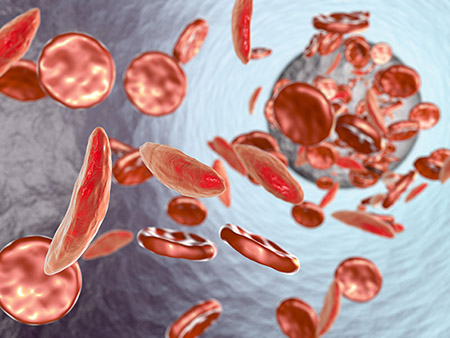 For individiuals living with sickle cell disease, vaso-occlusive crises are acute painful events that cause severe morbidity and decreases one’s quality of life.
For individiuals living with sickle cell disease, vaso-occlusive crises are acute painful events that cause severe morbidity and decreases one’s quality of life.
Vaso-occlusive crises are the primary reason that indivdiuals with sickle cell disease are admitted to the hospital. These acute painful episodes are unpredictable and can have devastating effects on the patient’s health.
However, the first targeted therapy for sickle cell disease and associated vaso-occlusive crises, Adakveo® (crizanlizumab), has received approval for use by the U.S. Food and Drug Administration, a huge step in the direction of treatment and management of sickle cell disease. Monthly, intravenous Adakveo can help reduce frequency of vaso-occlusive crises in adults and pediatric patients ages 16 and older.
Julie Kanter, M.D., director of the University of Alabama at Birmingham Adult Sickle Cell Clinic within the Division of Hematology and Oncology and Department of Medicine, participated in the SUSTAIN clinical trial. The trial tested the safety and efficacy crizanlizumab, and has Kanter served as prinicipal investigator of the ongoing adult and pediatric SOLACE trials; the adult SOLACE trial led to the subsequent drug approval by the FDA.
“The approval of Adakveo will decrease the rate of crisis in sickle cell disease and hopefully improve long term health outcomes in affected patients by decreasing their risk of death,” Kanter explained. “Simply put, it is a game changer. This will also allow us to see higher risk patients at least every month, which helps us recognize if other associated health problems are developing.”
Kanter is confident that this treatment option will help decrease the rate of vaso-occlusive crises-related hospitalizations and subsequently improve outcomes in sickle cell patients whose pain has altered their lives.
Kanter and her team in UAB’s Adult Sickle Cell Clinic are on the forefront of research and treatment of sickle cell disease. They have active ongoing clinical trials, such as the Bluebird bio’s novel gene replacement therapy trial, which hopes to cure affected indivdiuals. Another trial is the NIH-sponsored Sickle Cell Disease and Cardiovascular Risk – Red Cell Exchange (SCD-CARRE), in which researchers aim to discover if red cell transfusions and exchange can help decrease cardiovascular death.
Sickle cell is the result of a gene mutation that causes red blood cells to produce sickle hemoglobin, which forces red cells to take on a stiff, inflexible crescent shape. The crescent cells can clog blood vessels triggering painful episodes, pneumonia, central nervous system damage, strokes, kidney failure and other life threatening effects. Sickle cell disproportionately affects African Americans.